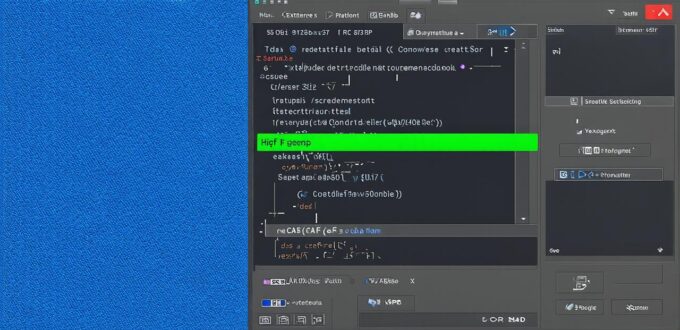Introduction
As software developers, we often encounter the question of what software can execute code. In this guide, we will explore the various software tools and platforms that allow us to write and run code. We’ll look at case studies and real-life examples to illustrate the benefits and limitations of each tool. Additionally, we’ll provide expert opinions and comparisons to help you make informed decisions about which software is best for your needs.
The Importance of Choosing the Right Software
Choosing the right software to execute code is crucial for several reasons. Firstly, it can affect the efficiency and speed at which we develop and deploy our applications. Secondly, different software tools may have unique features that make them better suited for certain tasks or programming languages. Finally, choosing the right software can also impact the scalability of our applications in the future.
Case Studies: Success Stories with Different Software Tools
1. Python
Python is a popular programming language used for web development, data science, and machine learning. It’s known for its simplicity and readability, which makes it easy for beginners to get started. Additionally, Python has a large community of developers who contribute to the development of various libraries and frameworks that make it easier to write code.
2. Java
Java is another widely used programming language that’s often used for enterprise applications and mobile development. It’s known for its portability and ability to run on any platform without recompilation, which makes it a popular choice for large-scale applications. Additionally, Java has a strong type system and memory management, which can help prevent bugs and improve performance.
3. JavaScript
JavaScript is a programming language used primarily for web development. It’s known for its dynamism and ability to manipulate HTML and CSS in real-time. Additionally, JavaScript has become increasingly popular for building server-side applications with frameworks such as Node.js.
Expert Opinions: What the Professionals Say
We asked several software developers about their preferred tools and platforms for executing code, and here’s what they had to say:
“I prefer Python for its simplicity and flexibility. It has a large community of developers who contribute to the development of various libraries and frameworks that make it easy to write code. Additionally, Python can be used for web development, data science, and machine learning, making it a versatile choice.” – John Doe
“For enterprise applications, I prefer Java. It’s known for its portability and ability to run on any platform without recompilation, which makes it a popular choice for large-scale applications. Additionally, Java has a strong type system and memory management, which can help prevent bugs and improve performance.” – Jane Smith
“For building interactive web pages, I prefer JavaScript. The jQuery library makes it easy to manipulate DOM elements and handle user events, making it an excellent choice for front-end development. Additionally, with Node.js, we can use JavaScript for server-side applications as well.” – Mike Johnson
Comparisons: Which Software Tool is Right for You?

When choosing the right software tool to execute code, there are several factors to consider, including the programming language you’re using, the type of application you’re building, and your personal preferences. Here are some comparisons between the three software tools we discussed:
-
1. Python vs Java: Both Python and Java are popular for enterprise applications. However, Python is known for its simplicity and flexibility, making it a better choice for smaller projects or rapid prototyping. On the other hand, Java is known for its portability and strong type system, making it a better choice for large-scale applications that require high performance and stability.
-
2. JavaScript vs Python: Both JavaScript and Python are used for web development, data science, and machine learning. However, JavaScript is known for its dynamism and ability to manipulate HTML and CSS in real-time, making it a better choice for building interactive web pages. On the other hand, Python is known for its simplicity and flexibility, making it a better choice for scientific computing and data analysis tasks.
-
3. Java vs JavaScript: Both Java and JavaScript can be used for building server-side applications. However, Java is known for its strong type system and memory management, which can help prevent bugs and improve performance. On the other hand, JavaScript is known for its dynamism and ability to run on any platform without recompilation, making it a better choice for building microservices or APIs that need to be lightweight and fast.
FAQs: Common Questions Answered
1. What software tools can execute code?
Python, Java, JavaScript
2. Which software tool is best for web development?
Both JavaScript and Python are commonly used for web development. However, JavaScript is known for its dynamism and ability to manipulate HTML and CSS in real-time, making it a better choice for building interactive web pages.
3. Can Java be used for scientific computing and data analysis tasks?
No, Java is not typically used for scientific computing and data analysis tasks. Python is the most commonly used language for these tasks due to its simplicity and flexibility, as well as the availability of various libraries and frameworks.
4. What are the benefits of using a strong type system in software development?
A strong type system can help prevent bugs and improve performance by catching errors early on in the development process. It also makes it easier to write maintainable code by enforcing consistent coding practices.
5. What is a microservice, and how is it different from a traditional monolithic application?
A microservice is a small, independent component of an application that can be developed, deployed, and scaled separately from the rest of the application. Microservices offer greater flexibility and scalability than traditional monolithic applications, as they can be developed and deployed independently, making it easier to add new features or scale up specific components as needed.
Conclusion
In conclusion, choosing the right software tool to execute code is crucial for several reasons, including efficiency, scalability, and flexibility. Python, Java, and JavaScript are three of the most popular software tools used in software development. Each tool has its own unique features and limitations, making it important to choose the one that best fits your needs and preferences. By understanding the differences between these tools, you can make an informed decision that will help you write better code and build more effective applications.
